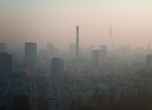
Photo by @imorpheus
Posted: Fri Mar 18 2011
Real name: Rick Martin
Twitter name: @1rick
Location: Near Machida, Tokyo
Occupation: Mostly I write freelance, for a number of publications and websites. I occasionally do some web work and some volleyball reporting for the FIVB. These days, there's not as much work as I'd like, which is one reason I have time to watch and curate quake reports.
Where were you at the time of the quake?
I was in my home office. You can see a video here.
At what point did you reach for Twitter, and why did that make sense to you?
I always have an eye to Twitter, so there was no 'getting on Twitter' when the quake hit, as my Twitter client is always open on the side of my desktop. Twitter is just a tool, though, and we shouldn't get carried away with social media back-pats.
Realistically speaking, most of the population is not on Twitter, so my main thought was to use other tools to assemble reliable information into chunks that could be easily repurposed by other people and disseminated to multiple web platforms. Updating my own site would not be as effective as using an embeddable Storify module, which can be put on any website. I started a few early on, including a ways-to-donate list. I'm currently updating a Storify stream over on the Japan Times website with some other editors. It's not a one-man job, so I'm glad they're pitching in.
I've made improvised RSS feeds for TEPCO and the Prime Minister's office so that others can use them too. I've also put some NIRS advisories up on Google Docs, and split them up into tiny chunks that could be crowd-translated by volunteers. They're published here. I'm trying to pass on any usable data that I find to people smarter than me who can use it, like @fleepcom, @mariansteinback, and @eroninjapan.
As for Twitter, I've put together a list of key journalists, translators, and news orgs that anyone can follow in real time.
Because most of Japan's English news orgs are print-only (or print copied to the web), I think that faster-moving, more versatile, repurposable information is pretty important to pick up the slack.
One other thing regarding Storify – one of the problems with watching #jpquake news is that reports often aren't clearly time-stamped, or they originate from another time zone. So, trying to add some time context to links is helpful, I think (ie, post them on a timeline).
Since then, what have your movements been like around Tokyo? Been anywhere unusual? Seen anything particularly striking?
Nothing striking, first hand. I did some shopping, but it’s not so crowded here, near Machida. I could have still bought lots of stuff if I’d needed it, though I’m trying not to 'panic-buy'.
Tell us honestly, now: had you heard of a sievert before Saturday?
Nope.
Many people are concerned about Tokyo's safety. At the time of writing, what's your position concerning the evacuation of the capital?
I'm not in any position to criticize anyone who goes or stays, but personally speaking, I've been weighing the factors and am not moving anywhere yet.
All being well, what are you looking forward to most in Tokyo's near future?
More solar infrastructure!
◄ Previous | Now showing 4 of 6 | Next ►
Tweets
- About Us |
- Work for Time Out |
- Send us info |
- Advertising |
- Mobile edition |
- Terms & Conditions |
- Privacy policy |
- Contact Us
Copyright © 2014 Time Out Tokyo














Add your comment